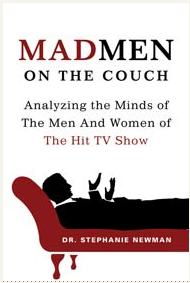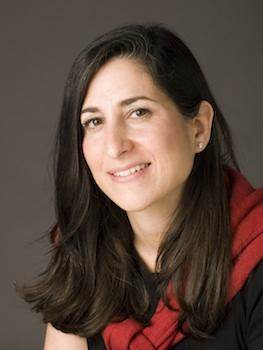Madmen on the Couch
- Category: On Our Radar
- Published: Monday, 27 February 2012 15:28
 For those of you who are eagerly waiting for the next season of Madmen, here’s something to tide you over and give you some insight at the same time. Clinical psychologist and Edgemont resident Dr. Stephanie Newman has just published a new book, Madmen on the Couch, in which she analyzes the minds of the men and women in the hit TV show. If you’ve ever wondered why Don Draper constantly sabotages himself or why Betty Draper is such an unhappy mother Newman offers a psychologist’s perspective on these complex and highly entertaining characters.
For those of you who are eagerly waiting for the next season of Madmen, here’s something to tide you over and give you some insight at the same time. Clinical psychologist and Edgemont resident Dr. Stephanie Newman has just published a new book, Madmen on the Couch, in which she analyzes the minds of the men and women in the hit TV show. If you’ve ever wondered why Don Draper constantly sabotages himself or why Betty Draper is such an unhappy mother Newman offers a psychologist’s perspective on these complex and highly entertaining characters.
To learn more about Dr. Newman and the book, we posed some questions and here is what we learned:
What inspired you to write a book about the characters in Mad Men?
I decided to write the Mad Men book while I was teaching candidates at the psychoanalytic institute. I was in class explaining the various ways in which different disorders manifest, and was struggling with how to effectively clarify my explanations and improve my clinical vignettes, when I spotted an article in the Wall Street Journal that described how—in a growing trend--clinical instructors were using fictional characters to illustrate myriad aspects of psychopathology. At this same time I was also intrigued by the very psychologically opaque characters in the AMC show Mad Men; by how well drawn their personalities were and how their complex actions could be elaborated. And then it all clicked: I thought it would be interesting and challenging to write about the show in such a way as to examine Don Draper and company through a psychological lens.
How did you get it published?
I pitched the book to an agent and wrote it fast, so as to coincide with the premier of the upcoming season. The entire writing, editing, and publishing process took about a year—including watching each episode numerous times (which did not feel like work at all!). This is a short time in the world of publishing, but as I said, I had to plough through really fast in order to publish in time for Season 5. I was lucky to work with a fabulous editor at St. Martin’s Press/Thomas Dunne, Margaret Smith, who was willing to burn the candle at both ends and shepherd the book through in rapid-fire fashion.
Did you enjoy writing it and what did you learn through the process?
I absolutely loved the writing and editing process. I enjoyed receiving input about my writing and about what those who buy books might want to read. I have always enjoyed writing, but had never before had the experience of collaborating with a professional editor. Moving a paragraph here and there and shifting the emphasis, even slightly, was eye-opening for me. Starting with nothing more than an idea and building an entire book, word for word from blank page (or screen!) to competed volume, was a new experience. The huge amount of time and work it entailed was what surprised me most—I don’t think I slept for an entire year!
Is this your first book?
Before writing Mad Men on the Couch I had co-edited another work, Money Talks, a collection of papers written by therapists and analysts about the incursion of money, fees, and the recent recession into the clinical situation. While I had contributed a paper in that volume, Mad Men on the Couch is the first book I have written.
Writing about Mad Men proved to be an enriching and all-consuming project; I began to think about the characters in the oddest places and at the strangest times. Many of them started to bleed into my consciousness and to pop up at the most unexpected moments. I could be in a social situation and would find myself wondering what Don Draper would think about something, a joke, maybe. And I would frequently notice how 2012 differs from 1962, with respect to women's rights and the female position in society; same with the different ways in which people of color were treated back then versus now. I was most of all fascinated by the different family sensibility that existed during the Mad Men era. Today we tend to focus intensely on and revolve weekends around children's activities. Don and Betty would not spend even a minute standing on a soccer field—that’s just not how people lived. While child rearing takes up a lot of space in our millennial brains, it did not seem to be a preoccupation fifty years ago.
in the oddest places and at the strangest times. Many of them started to bleed into my consciousness and to pop up at the most unexpected moments. I could be in a social situation and would find myself wondering what Don Draper would think about something, a joke, maybe. And I would frequently notice how 2012 differs from 1962, with respect to women's rights and the female position in society; same with the different ways in which people of color were treated back then versus now. I was most of all fascinated by the different family sensibility that existed during the Mad Men era. Today we tend to focus intensely on and revolve weekends around children's activities. Don and Betty would not spend even a minute standing on a soccer field—that’s just not how people lived. While child rearing takes up a lot of space in our millennial brains, it did not seem to be a preoccupation fifty years ago.
Do you think we struggle with similar issues to those faced by the characters depicted on the show?
I do think our contemporaries struggle with many of the same dilemmas as those wrestled with by the show’s characters. They all want to spin their personal images, get ahead at work, and maintain interpersonal relationships. And these struggles and frailties are what make the characters on Mad Men are human; they are vulnerable and they trip themselves up in many of the same ways viewers do. People seem to relate to these characters and to wonder what makes them tick. I think that’s what is largely responsible for the show’s appeal and its success.
What other television shows do you watch?
There are other shows that are psychological in nature. I also like to watch Modern Family; these characters also struggle with everyday problems like image, relationships, difficulties at work and at home, and the writers find humorous ways to confront stereotypes, which makes the show interesting to watch.
What similarities and differences do you see between the Westchester that is shown on the show and the Westchester we live in today?
Given that people have always seemed to be preoccupied with relationships and career concerns, it appears that Westchester hasn’t changed that much since the fictional Drapers tooled around Ossining in the shiny red Cadillac, some 50 years ago. If I had to point to one major change it would probably by the central focus today around child-rearing and children’s activities. Back then there was not a Gymboree or toddler music class in every small town. Now families devote afternoons, evenings, and weekends to child-focused extra-curricular activities. Don, Betty, Peggy, Pete, Roger, and Joan would probably not recognize this aspect of life in contemporary Westchester.
Tell us about yourself and your education:
I grew up in the New York area and went to grad school at Columbia University Teachers College, where I received training as a Clinical Psychologist. I then completed a post-doctoral program at IPE, which is NYU Medical Center’s psychoanalytic institute.
 I currently see patients in private practice and try to write as much as I can. In addition to writing Mad Men on the Couch, I have been regularly contributing articles to the on- line edition of Psychology Today at Apologies to Freud (for an example, click here:) I am also a mother of two very energetic young children. And unlike the Drapers, I try my best to host play dates and make it to sports matches whenever I can. We have been in Edgemont for almost 5 years, and have loved living in the area. I cannot think of a better place to raise a family. The schools and sports programs are what drew us here in the first place; all have proved to be excellent.
I currently see patients in private practice and try to write as much as I can. In addition to writing Mad Men on the Couch, I have been regularly contributing articles to the on- line edition of Psychology Today at Apologies to Freud (for an example, click here:) I am also a mother of two very energetic young children. And unlike the Drapers, I try my best to host play dates and make it to sports matches whenever I can. We have been in Edgemont for almost 5 years, and have loved living in the area. I cannot think of a better place to raise a family. The schools and sports programs are what drew us here in the first place; all have proved to be excellent.
How do you plan to promote the book?
I am very involved with different social media avenues such as Twitter (@MadMenOnCouch) and Facebook. I am scheduled to appear on several radio shows and possibly some TV shows. And the print media has shown interest in covering the book, as well. I will also be writing about it on line in Psychology Today and speaking about it locally and in New York City (one school has invited me to explain to its parent body what makes Betty Draper Frances such a cold mother. That should be fun!).
Madmen on the Couch is published by Thomas Dunne Book of St. Martin’s Griffin and will be available at Barnes and Noble ($14.99) and can also be purchased as an e-book ($12.99). Check it out on Amazon here and learn more about Dr. Newman here.














